![]() ChiaroScuro presents
ChiaroScuro presents
![]() ChiaroScuro presents
ChiaroScuro presents
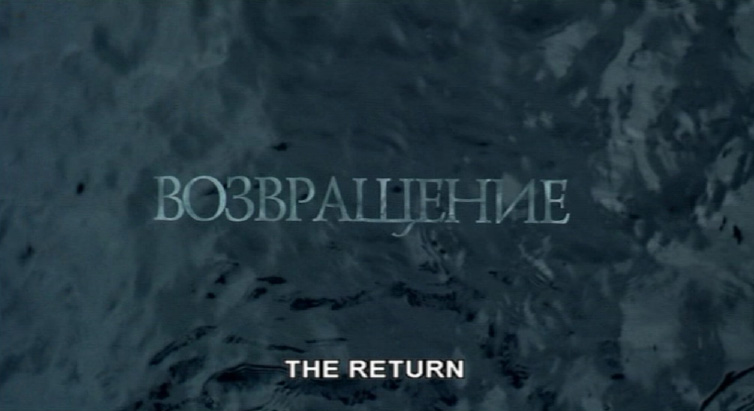
(The Return | Le retour | Die Rückkehr)
by Andrej Zvjagincev [Андрей Звягинцев]
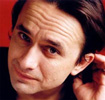
Russia 2003
|
(click posters to enlarge) |
|
"Beautifully structured and emotionally wrenching, this 2003 debut feature immediately establishes Russian filmmaker Andrey Zvyagintsev as a master. It charts a father's uneasy return to his wife and two adolescent sons after a long and unexplained absence, a reunion capped by his ill-fated fishing trip with the two boys. A former actor, Zvyagintsev elicits first-rate performances from his male leads, but what registers most is the sharpness and intensity of his vision of nature and childhood experience. [...] this has been described by the director as "a mythological look [at] human life," as accurate a description as any I've encountered."
— Jonathan Rosenbaum, Chicago Reader
"Winner of the same Venice Film Festival that gave a decidedly mixed reception to The Dreamers, Andrey Zvyagintsev's The Return is also suggestive of a lost era—the highly crafted allegorical Eastern European art films of the '60s and '70s.
"Die
Rückkehr". Dieser Titel paßt im doppelten Sinn, denn der Film, den
Andrej Swjaginzew gedreht hat, erzählt nicht nur von einer Rückkehr,
der Wiederkehr des verschwundenen Vaters ins Leben zweier Kinder,
sondern er symbolisiert sie auch: die Rückkehr des russischen Kinos auf
die Landkarte der Kinematografie. Und er bestätigt eine Erfahrung, die
man alle paar Jahre bei der Begegnung mit einem Kinoerstling machen
kann: Große Regisseure werden nicht allmählich groß. Sie sind sofort
da, wo andere nie hingelangen werden, im ersten Anlauf. Andrej
Swjaginzew ist ein großer Regisseur, und "Die Rückkehr" ist sein Debüt.
"Le
premier film de Andreï Zviaguinstev est un film d’une beauté plastique
et d’une maîtrise narrative peu communes. Le récit qu’il nous propose
est minimaliste : trois personnages, un homme et deux garçons,
effectuent un voyage en direction d’un lieu reculé, puis une fois
isolés dans ce lieu, s’engagent dans une lutte l’un contre l’autre. La
subtilité de la narration se situe sur cette frontière étroite derrière
laquelle l’argument naturaliste laisse place à l’émergence des mythes
et des figures du conte. Le père, tour à tour ogre et figure
protectrice, les deux fils, parfois soudés contre l’ennemi commun, le
plus souvent séparés par la rivalité affective.
|
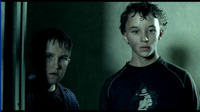
|
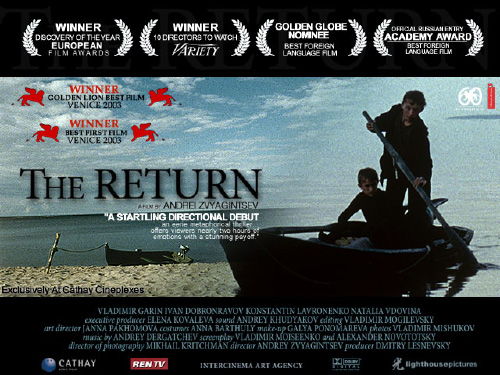
|
|
||
|
Distribution:
|
UGC Films UK / 20th Century Fox Home Entertainment UK Region 2 (Europe)
|
|
|
Runtime:
|
105:55 min (-4% PAL = 110 min at 24 fps) | |
|
Video:
|
1.84:1 / 16:9 Anamorphic WideScreen Average Bitrate: 5.53 mb/s (4.30 GB) PAL 720x576 25.00 f/s |
|
|
Audio:
|
• Russian Dolby Digital 5.1 Surround • Russian Dolby 2.0 Surround |
|
|
Subtitles:
|
English (fixed) | |
|
Features:
|
• Making of "Vosvraščenie: Fil'm o fil'me" (63:24 min, Russian with optional English subtitles)
• Theatrical Trailer (02:03 min, 16:9) |
|
| DVD Release Date: 4 October 2004 Keep Case Chapters: 10 DVD Encoding: PAL Region 2 (EU/UK) 1xSS-DL/DVD-9 (7.62 GB) |
||
|
Comment:
|
Zvjagincev's beautiful film becomes even more mysterious after the third viewing. Watch carefully the photograph of the family in the last sequence of the movie and compare it with the same photo from the beginning. There is an important difference. This is above all an inward mind's journey of adolescence and a sharp, precise observation of the distorted and confused role of masculinity in today's Russian society.
A very well-crafted film, heavily bleached and filtered, in many scenes almost monochrome, drenched in blues, greens and greys. The DVD transfer by UGC is handsome and almost free of artefacts, although sometimes the framing seems too tight and especially on the left side, the picture is cropped (you will spot this during the credits, or look at the slightly imbalanced composition of frame 3); there is also a blue streak on the left, but on most TVs this is invisible due to overscanning. The extras include an hour-long Making-of, dedicated to the young actor Vladimir Garin (the elder brother Andrej), who died almost immediately after the completion of the movie by drowning in a lake near St. Petersburg. -- Markus / ChiaroScuro Film: ***** out of ***** |
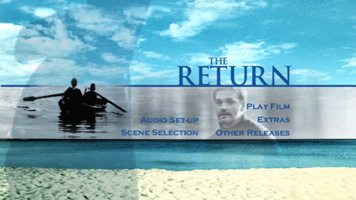 |
 |
Frame 1
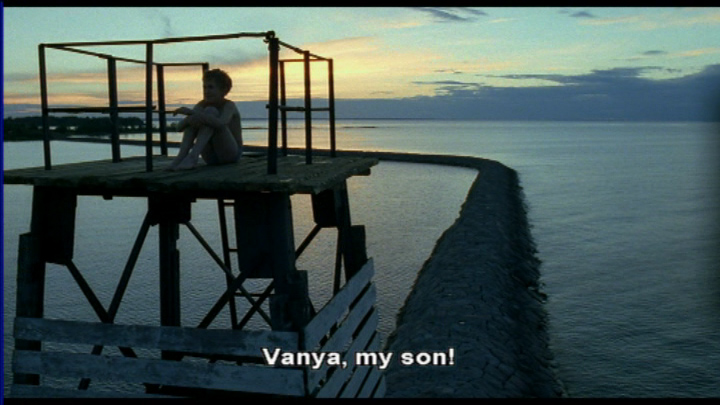 |
Frame 2
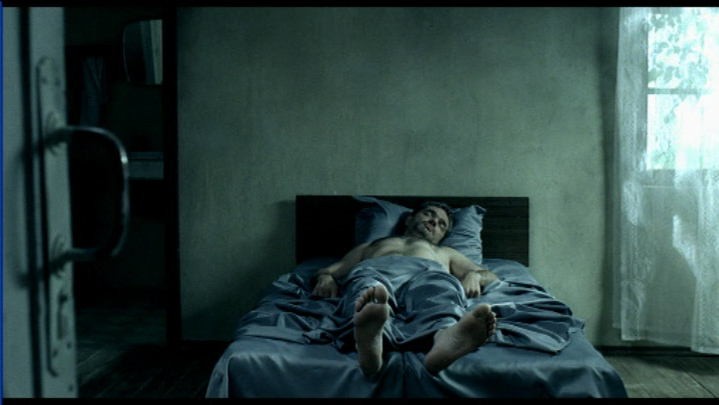 |
Frame 3
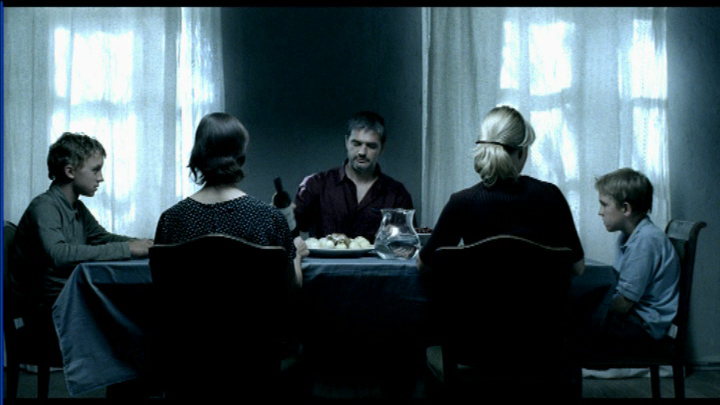 |
Frame 4
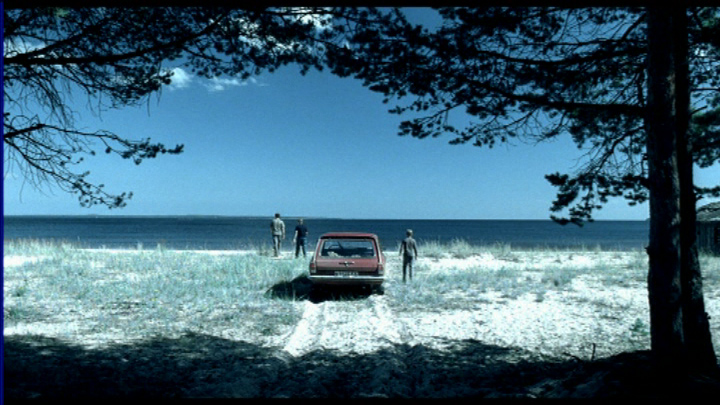 |
Frame 5
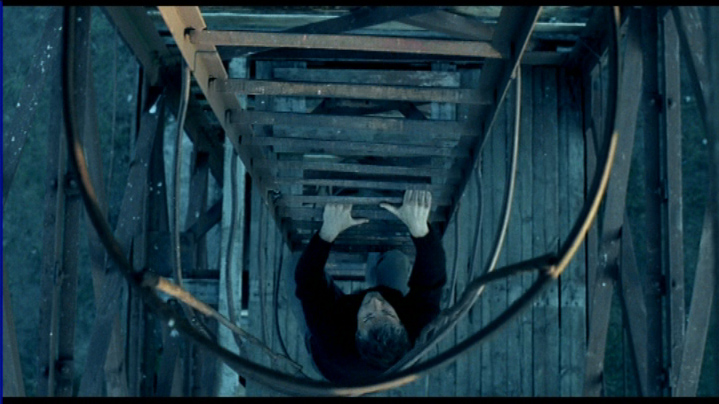 |
Average Bitrate :
5.53 mb/s
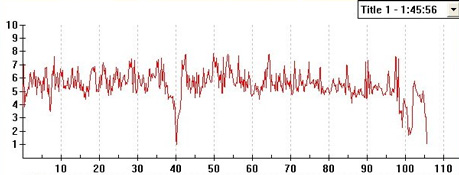
The Vertical axis represents the bits transferred per second. The Horizontal is the time in minutes
|
This is a strictly non-professional and non-commercial DVD review. Don't expect industry reference work! All ChiaroScuro captures are taken under MacOS X using VideoLAN and Snapz ProX. |